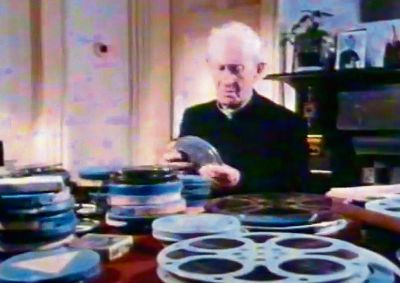IT is close to a century since the Ramelton born cleric, Father Tommy Doherty, began filming the lives and events of his fellow parishioners in Donegal.
An extensive collection incorporating nineteen hours of film on eighty reels now rest in the Irish Film Archives in Dublin’s Eustace Street. But they rest uneasily – the fragile threads of time threatening their very existence as continuing deterioration leave many of them open to further damage and ultimate decimation.
For some years now, the late Canon Doherty’s nephew, Tommy Francis, has been at pains to highlight the situation and looking for agencies and funding to restore this unique film collection.
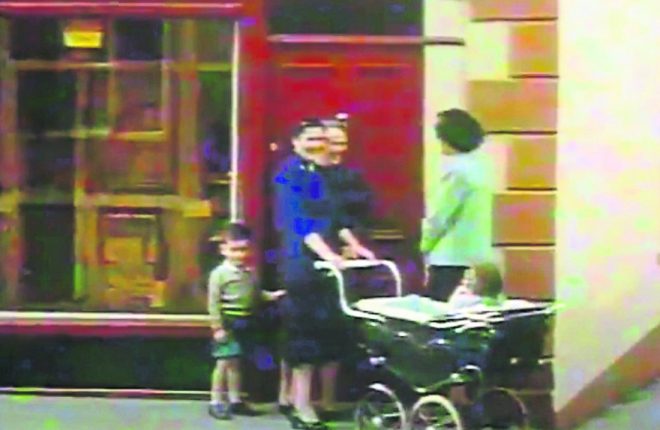
The ordinary and the extraordinary was documented by Fr Tommy over many years, including this meeting of neighbours during his time as curate in Donegal Town.
“Unless something is done now and done urgently we will lose these films and have nothing to show for the painstaking hours, days and years that Canon Tommy put into compiling them.
“Their importance can’t be overstated – they provide a social history and an insight into the lives of the numerous people that he filmed in all corners of the county over the decades,” insists the Falcarragh-based former Senator.
The latter holds in his possession a number of letters and other material relating to the collection including correspondence, dating back a number of years, from Peter Feeney, the current Press Ombudsman, who first came into contact with Canon Doherty and his film work back in 1980.
RTE. had been commissioned to produce a series of television documentaries to commemorate the hundredth anniversary of Eamon De Valera scheduled to be broadcast in 1982.
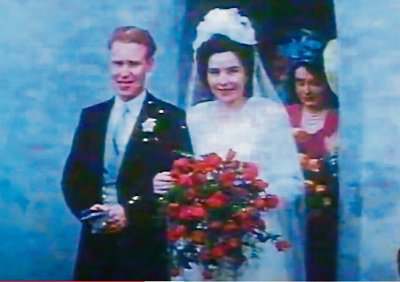
Fr Tommy was asked to film many weddings and social occasions all over the county including a Devine family wedding in Strabane.
Feeney was assigned as producer-director of the series and as part of his research put in a call to the Gay Byrne radio show for members of the public to come forward with any old films from the first half of the 20th century that may have been lying around in dusty attics.
“One of the responses I received was from Fr Tommy Doherty, Parish Priest in Dunfanaghy, County Donegal.
“I distinctly remember driving up to Donegal on a cold stormy night and arriving at Fr Doherty’s house. He offered to show me the reels of film, explaining that he had compiled local newsreels of everyday life as an incentive to get people into the cinema he ran at the time. He said that he knew people would come to see his newsreels and stay on for the feature films he was showing.
“He was running his cinema shows to give his people somewhere to meet and enjoy themselves”
Fr Tommy had acquired his first camera when he was working in Scotland in the 1920’s and upon his return to his native county he began recording everyday life.
When he sat down to watch some of the old reels, the then producer-director could not have been more impressed or enthralled.
“What he showed me that night in Dunfanaghy was a unique visual record of the lives of everyday people in Donegal from the 1930’s to the 1950’s. Images of fairs, train journeys, processions, town life, markets, harvesting, etc came from his projector. I was very excited. Fr Doherty had a treasure trove of visual images which were not just of local importance, but also of national importance.”
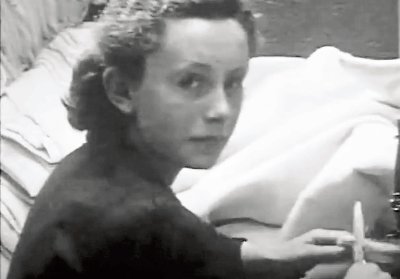
A worker in the Convoy Woollen Mill pictured by Fr Doherty. It employed around 350 people at it’s height.
A selection of the films were subsequently brought to RTE in Dublin and copied for inclusion in ‘The Age of De Valera’ series.
“I was acutely conscious that there was a danger of Fr Doherty’s films being lost to the nation. After completion of the De Valera series, I approached Fr Doherty about the possibility of making a once-off documentary based on his films. Fr Doherty generously agreed to my proposal,” Mr Feeney revealed.
Thus was born the documentary ‘Filling the Fourpenny Seats’, highlighting aspects of Fr Tommy’s film work and his own reminisces of the everyday life of his parishioners in Donegal.
The documentary was broadcast by RTE in 1985 to great acclaim both locally and nationally.
But while all of his films had been transported to Dublin not all of them were in a position to be restored – the cost was prohibitive – only the parts that ultimately featured in the documentary. Describing the trove as an important part of the visual history of the Free State in the first decades of independence, Mr Feeney said they showed in colour and black and white a way of life in rural Ireland that was an important part of the nation’s heritage.
Fr Tommy had commenced filming shortly after his ordination in 1927 – everyday activities involving farming, weddings, funerals, religious events and leisure pursuits.
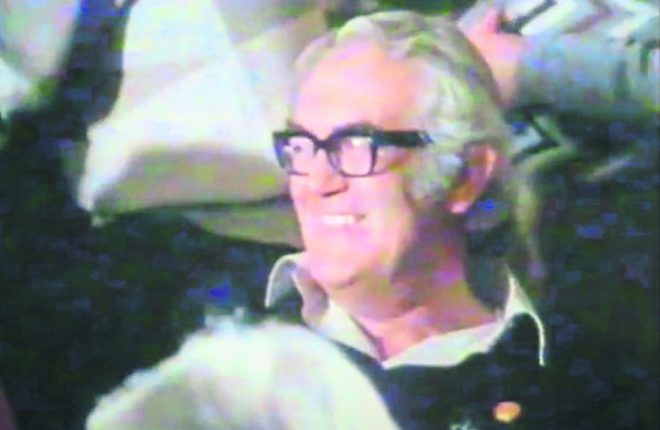
The late Jim Kennedy, Letterkenny, enjoying one of Fr. Doherty’s famous entertainment nights in the Shandon Hotel.
He also filmed the last train running from Creeslough to Burtonport in 1941, a mobile TB x-ray machine visiting Donegal communities including Arranmore, workers at the Convoy Woollen Mills, and the Burtonport Regatta among countless other activities and the people involved.
He ran commercial cinemas in Convoy and Donegal Town, trailing the main features with those of his own films, his audiences enraptured with images of local events and catching sight of themselves and others they knew.
It has long been an objective of Tommy Francis and others to ensure the preservation of this invaluable collection.
“They’re currently in the national film archives but there’s a very small staff there and the archives are not subsidised enough to do the necessary work. It will be a very expensive process but it needs to be done before those films are destroyed completely.”
That’s a view shared by Mr Feeney who made that journey all those years ago to Dunfanaghy to view a selection of them.
“If Fr Doherty’s film is to survive as part of the national heritage it is essential that it be digitalised and made safe for future generations. It would be unconscionable if his films were to be lost through neglect.”

Fr. Tommy filmed the funeral of the late Bishop McNeely attended by thousands including former taoisigh Eamon de Valera and Sean Lemass.
Tommy Francis is hoping that some agency or body will come forward with the necessary funding to ensure the preservation of his uncle’s films.
Canon Doherty, who was named Donegal Person of the year in 1985, passed away on December 2, 1998 but his memory lives on in the events and people he filmed for posterity.
The year 2027 will mark a century since his initial venture into filming but it can only be hoped that by then his films will have been richly preserved and consequently available for students, researchers, historians and others interested in Donegal’s past.
For further information please contact Tommy Francis on 0874140087 or Declan Doherty, 0872330980 or by email, dohertydec@gmail.com
Receive quality journalism wherever you are, on any device. Keep up to date from the comfort of your own home with a digital subscription.
Any time | Any place | Anywhere




